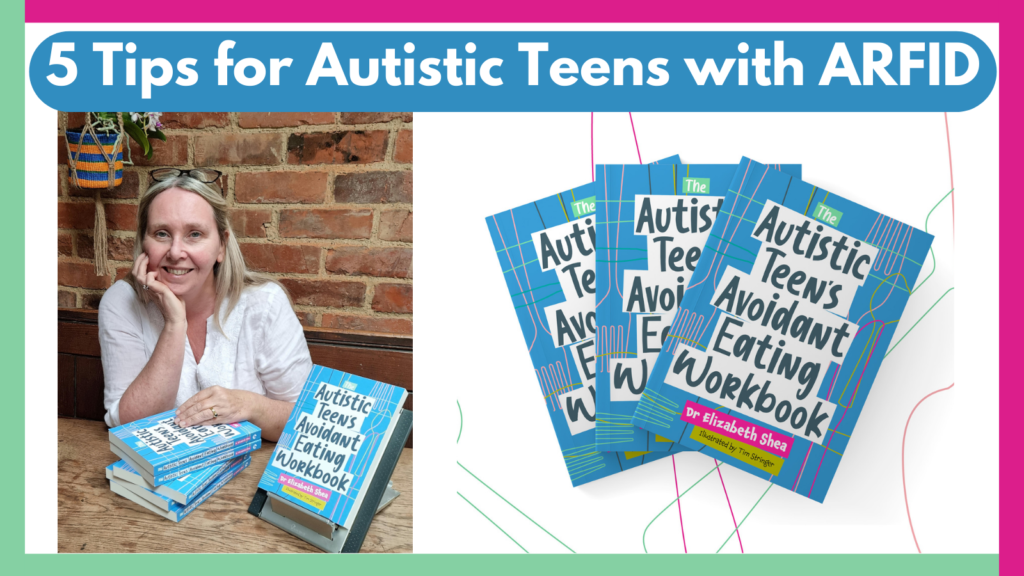5 Back to School Tips for Autistic Teens with ARFID

In this blog article, author and Clinical Psychologist, Elizabeth Shea, shares 5 top tips for managing food anxiety and avoidant eating at school to help you thrive in this new school year.
Welcome to September, the gateway to Autumn. This is my favourite time of year as I enjoy it when things cool down a bit from the summer and the leaves on the trees turn yellow, gold and red. For many of us, September means a new school or college term, or maybe even a new school or college itself. If so, then I hope it all goes well for you, but if you have problems with food or eating then a new school or college can be extremely daunting.
This is particularly true for anyone with Avoidant and Restrictive Food Intake Disorder or ‘ARFID’[1]. People with ARFID typically struggle to recognise hunger and are not very motivated to eat, they usually have difficulties with foods of a particular texture, smell or taste and can become extremely anxious about new foods or foods that look different to usual and will avoid them. This is true even if the packaging of a food changes!

This relatively new eating disorder can affect anyone of any age but it often starts in childhood and continues through adolescence into adulthood. ARFID and other types of avoidant and restricted eating patterns are also more common in autistic or neurodivergent people. We think this is because those individuals have differences in the way sensory information is processed by the brain. Sensory differences are huge when it comes to eating as they impact how we see, feel, smell and taste foods and even how we know when we are hungry or full.
As a result, people with ARFID generally stick to the same ‘safe’ foods and eat these over and over again. As long as they are able to get those foods easily and are generally healthy life around food and eating is usually manageable. However, ARFID can become much harder to manage when there is a life-change such as going to a new school or college.
Here are some of the worries you might have if you have ARFID and you are starting a new school or college:
How will I know when to eat at my new school/college?
What will I do if I am not allowed to take my safe foods into school/college?
How will I cope with the food sights and smells in the school/college canteen?
What if I’m too anxious to eat in front of other people?
What will other people, especially new people, think about my eating?
If these worries sound familiar, then the good news is that there are strategies you can use to help your eating be more manageable, even in a new place. Even better news is that if you are in your teens or early adulthood then these are often easier to do than you think.
The most important thing to remember is that these strategies are under your control, you can decide if, when, where and how to use them.
So, here are my top 5 tips for managing ARFID in a new school or college:
- Use a timetable or schedule to help you remember when to eat. This will help if you have problems recognising your appetite (the brain’s signal of hunger) and is really important for staying healthy. You can set an alarm on a mobile to remind you.
- Speak to a trusted teacher or tutor and tell them about your eating. This will help if you need permission to bring in your own safe foods from home. You could show them this blog to help them understand ARFID.
- Learn to cope with different sights, smells, textures and tastes of food by joining in a cooking class or sitting with a friend who is eating something new to you. This will help you to get more familiar and comfortable with new foods. Remember, you don’t have to eat that food yourself for your brain to get used to the new sensations that food brings.
- Reduce any anxiety you have about eating, particularly eating with other people by finding a quieter place to eat at lunch or break times. This will help you feel calmer and usually means you can eat more.
- Don’t be afraid to tell new people about ARFID. This will help other people learn about you and is a step towards making new friends. I bet you’ll soon find other people have worries about starting a new school/college; maybe you’ll even be able to help them!
So, happy Autumn and happy new school or college and don’t let ARFID or eating issues hold you back!
[1] American Psychiatric Association (2013). Diagnostic and Statistical Manual of Mental Disorders, 5th Edition.
The Autistic Teen’s Avoidant Eating Workbook by Elizabeth Shea is available to own now. Get your copy here!